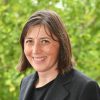Dean Christopher Morphew has announced that Laura Quaynor has accepted his invitation to a three-year term as chair the Department of Advanced Studies in Education beginning July 1, 2022. The Department includes the Doctor of Philosophy, the Doctor of Education and the Master of Education in the Health Professions programs. Quaynor will replace outgoing chair Yolanda Abel, who will complete her term as inaugural chair of the Department on June 30.
Quaynor is currently an associate professor in the Doctor of Education program, where she supports first-year doctoral students and helps them develop their academic writing skills. Her background is in ESL and French-immersion education with particular focus on education in West Africa. In her published work, Quaynor dissects the role of education in healing societies fragmented by conflict and deep cultural divisions.
“I study how civic education shapes national identity and supports democracy in multiple countries,” Quaynor says. “Some of those nations, like Liberia, are still rebuilding from civil war. In others, like the United States, educators support immigrant and refugee students as the country grapples with historical and current injustices.”
Education—and educators—are a cornerstone of rebuilding. Their role, she writes, is to remind divided cultures of their collective and interwoven pasts, their mutually beneficial futures, and the civic principles that can salve wounds as they lay a strong foundation for enduring success.
In her peer-reviewed studies, Quaynor has illuminated just what those civic principles are and offers recommendations to educators and researchers for imparting and strengthening them through public education. For example, Quaynor notes that including regional or global civic identities is one strategy to build cohesion. She also notes that trends in ethnic and national civic identities are often more rooted in a country’s deep past than in recent conflict. Additionally, she finds that gender disparities can impact civic engagement.
“Young men and women in Liberia report differing access to traditional leaders, but not the court system,” Quaynor points out.
Throughout all her work, Quaynor highlights the ways that educators in divided societies encourage and respond to young people as youth build their civic knowledge, skills, and sense of efficacy.
“We work on centering young people in this work as a ‘means to speak’ about their experiences in ways that have not been available traditionally,” Quaynor says. “We then work to understand how adults can build on those lessons and connect to young people’s lived experiences of national identity through education.”
Quaynor has contributed chapters to five edited scholarly books and considered ways educators can build their own networks through digital communities. In one study examining how teachers discuss global education on Twitter, she identified a tendency for exchanges focused on feelings of “connectedness,” while overlooking human rights, which is concerning given the importance of rights-based conversations, highlighted by organizations such as the United Nations as a critical frame for building healthy societies.
Across research sites, she continues to study how teachers can support student’ civic development amidst societal conflict. “Teachers’ abilities to respect students’ opinions and engage meaningfully with them across varied lived experiences remains a crucial component of civic education,” Quaynor says.

